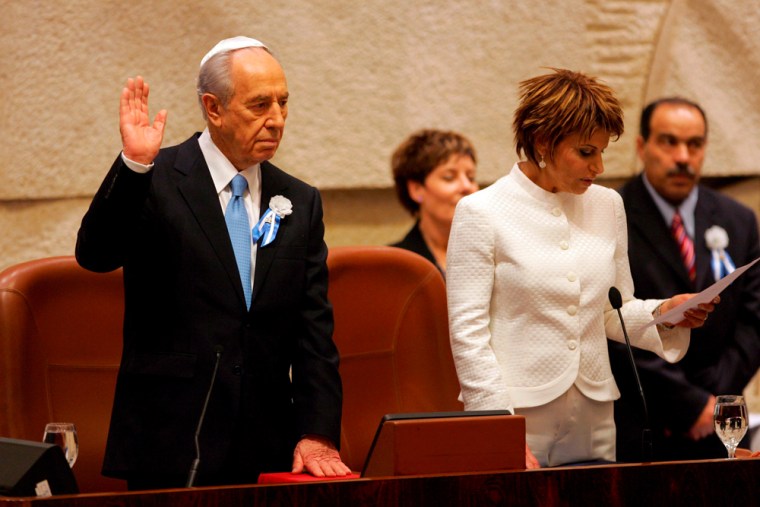Elder statesman Shimon Peres took office as Israel's ninth president Sunday, pledging to devote his seven-year term in the ceremonial post to his lifelong dream of Middle East peace.
Taking his oath of office before parliament, Peres, 83, said Israel must make peace with the Palestinians and Arab countries through measures small and large, including cooperatively digging a canal and lakes in the desert between Israel and Jordan.
"We must encourage peace here at home, with our neighbors, in the region," he said.
The swearing-in capped a six-decade political career that has included international acclaim and a Nobel Peace Prize for efforts to create peace in the region. But Peres also suffered a string of embarrassing electoral defeats at home, where he was perceived by many as an unrealistic dreamer.
Peres has long been among the most dovish members of the Israeli leadership. He said in a half-hour interview with The Associated Press before his swearing-in that despite the constraints of his new job, he would not halt his efforts for peace with the Palestinians. He said that would require Israel to withdraw from significant pieces of territory captured in the 1967 Mideast War — a position still opposed by large parts of the Israeli public.
"We have to get rid of the territories," he said, referring to the West Bank, insisting that his long-held position is the majority view in Israel today.
Peres even expressed hope of making peace with archenemy Iran.
"After such a long career, let me just say something: My appetite to manage is over. My inclination to dream and to envisage is greater," he said.
Regaining public trust
Peres inherits an office tarnished by a sex scandal that forced his predecessor to resign, an ascension widely welcomed by a public sick of scandal.
Looking vigorous in a dark suit and crisp light-blue shirt, he said he would use the presidency to "encourage" the government to take steps for peace, offer advice to the nation's leaders and "speak to the people."
"In public life, you don't use swords. You use words. You talk to people. You have dialogue. That's what I'm going to do. I don't have any force but the force of my conviction," he said.
Many Israelis have scorned Peres as a romantic for his belief in a "new Middle East," a phrase he coined in the 1990s when peace with the Palestinians seemed close.
Though that optimistic vision never materialized, Peres has not lost his idealism. Throughout the interview, he refused to dwell on the past and insisted on discussing aspirations like ending global warming and poverty, making vague references to "the cosmos" and improving the world for youth.
Peres said he would be willing to meet a president of Iran if it would advance the cause of peace, but he would not sit down with the Islamic republic's current leader, Mahmoud Ahmadinejad, who has repeatedly called for Israel's elimination.
Peres, the last politically active member of Israel's founding generation, was a senior aide to Israel's first prime minister, David Ben Gurion; developed Israel's nuclear program; built up the military in the 1950s and has held every senior government post, including three stints as prime minister.
Nobel prize winner
As foreign minister, he played a key role in the first Israeli-Palestinian peace accord, earning him the Nobel prize in 1994 and unprecedented stature abroad as a revered statesman. He also soothed the nation as caretaker leader following the 1995 assassination of Prime Minister Yitzhak Rabin.
But until last month, Peres had never won an election.
The parliament overwhelmingly elected him over two other contenders on June 13 to succeed Moshe Katsav, who left office after four former female employees accused him of a series of sex crimes, including rape, sexual assault and sexual harassment.
Facing indictment, Katsav resigned under a plea bargain that allowed him to escape the most serious charges and avoid jail. The deal has been put on hold pending a court challenge by women's right groups.
Political power is concentrated in the hands of the prime minister under Israel's parliamentary system. The president plays a largely ceremonial role, representing the government at official functions and serving as a unifying figure in a country riven by deep political divisions, especially over how to pursue peace with the Palestinians.
